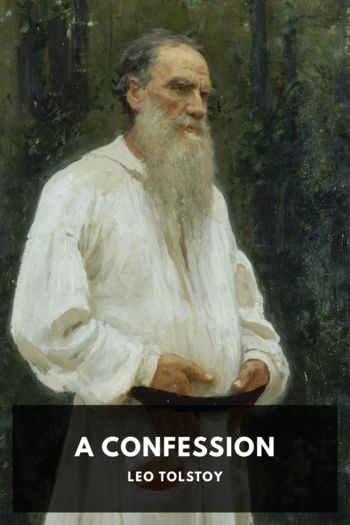Short Fiction by Leo Tolstoy (book reader for pc TXT) 📕

- Author: Leo Tolstoy
Book online «Short Fiction by Leo Tolstoy (book reader for pc TXT) 📕». Author Leo Tolstoy
What was to be done? Once more the Council was summoned. What course could they adopt? The man would not go. They reflected and considered. The only way to get rid of him was to offer him a pension. And so they reported to the King. “There is nothing else for it,” said they; “we must get rid of him somehow.” The sum fixed was 600 francs, and this was announced to the prisoner.
“Well,” said he, “I don’t mind, so long as you undertake to pay it regularly. On that condition I am willing to go.”
So the matter was settled. He received one-third of his annuity in advance, and left the King’s dominions. It was only a quarter of an hour by rail; and he emigrated, and settled just across the frontier, where he bought a bit of land, started market-gardening, and now lives comfortably. He always goes at the proper time to draw his pension. Having received it, he goes to the gaming tables, stakes two or three francs, sometimes wins and sometimes loses, and then returns home. He lives peaceably and well.
It is a good thing that he did not commit his crime in a country where they do not grudge expense to cut a man’s head off, or to keeping him in prison for life.
1897.
Father Sergius IIn Petersburg in the eighteen-forties a surprising event occurred. An officer of the Cuirassier Life Guards, a handsome prince who everyone predicted would become aide-de-camp to the Emperor Nicholas I and have a brilliant career, left the service, broke off his engagement to a beautiful maid of honour, a favourite of the Empress’s, gave his small estate to his sister, and retired to a monastery to become a monk.
This event appeared extraordinary and inexplicable to those who did not know his inner motives, but for Prince Stepán Kasátsky himself it all occurred so naturally that he could not imagine how he could have acted otherwise.
His father, a retired colonel of the Guards, had died when Stepán was twelve, and sorry as his mother was to part from her son, she entered him at the Military College as her deceased husband had intended.
The widow herself, with her daughter, Varvára, moved to Petersburg to be near her son and have him with her for the holidays.
The boy was distinguished both by his brilliant ability and by his immense self-esteem. He was first both in his studies—especially in mathematics, of which he was particularly fond—and also in drill and in riding. Though of more than average height, he was handsome and agile, and he would have been an altogether exemplary cadet had it not been for his quick temper. He was remarkably truthful, and was neither dissipated nor addicted to drink. The only faults that marred his conduct were fits of fury to which he was subject and during which he lost control of himself and became like a wild animal. He once nearly threw out of the window another cadet who had begun to tease him about his collection of minerals. On another occasion he came almost completely to grief by flinging a whole dish of cutlets at an officer who was acting as steward, attacking him and, it was said, striking him for having broken his word and told a barefaced lie. He would certainly have been reduced to the ranks had not the Director of the College hushed up the whole matter and dismissed the steward.
By the time he was eighteen he had finished his College course and received a commission as lieutenant in an aristocratic regiment of the Guards.
The Emperor Nicholas Pávlovich (Nicholas I) had noticed him while he was still at the College, and continued to take notice of him in the regiment, and it was on this account that people predicted for him an appointment as aide-de-camp to the Emperor. Kasátsky himself strongly desired it, not from ambition only but chiefly because since his cadet days he had been passionately devoted to Nicholas Pávlovich. The Emperor had often visited the Military College and every time Kasátsky saw that tall erect figure, with breast expanded in its military overcoat, entering with brisk step, saw the cropped side-whiskers, the moustache, the aquiline nose, and heard the sonorous voice exchanging greetings with the cadets, he was seized by the same rapture that he experienced later on when he met the woman he loved. Indeed, his passionate adoration of the Emperor was even stronger: he wished to sacrifice something—everything, even himself—to prove his complete devotion. And the Emperor Nicholas was conscious of evoking this rapture and deliberately aroused it. He played with the cadets, surrounded himself with them, treating them sometimes with childish simplicity, sometimes as a friend, and then again with majestic solemnity. After that affair with the officer, Nicholas Pávlovich said nothing to Kasátsky, but when the latter approached he waved him away theatrically, frowned, shook his finger at him, and afterwards when leaving, said: “Remember that I know everything. There are some things I would rather not know, but they remain here,” and he pointed to his heart.
When on leaving College the cadets were received by the Emperor, he did not again refer to Kasátsky’s offence, but told them all, as was his custom, that they should serve him and the fatherland loyally, that he would always be their best friend, and that when necessary they might approach him direct. All the cadets were as usual greatly moved, and Kasátsky even shed tears, remembering the past, and vowed that he





Comments (0)